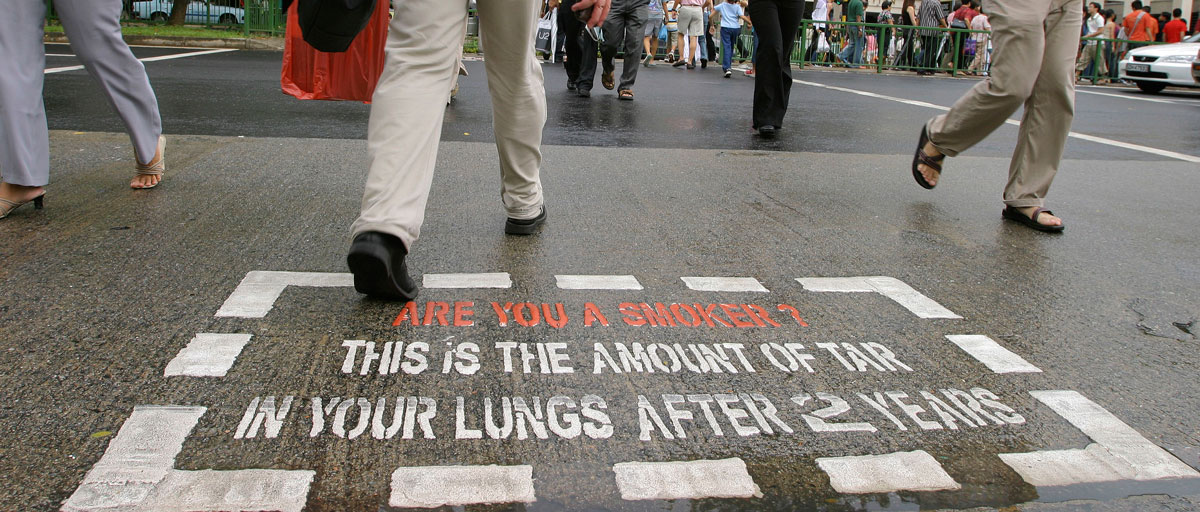
A new analysis in the journal Science shows that social norms can cross tipping points faster if new behaviour is difficult for others to ignore. One example is the rapid change in how people feel about smoking. Photo: A. Maslennikov/Azote
social norms
From vicious to virtuous
Social norms can cross tipping points faster if new behaviour is difficult for others to ignore
- Group behaviour in societies tends to change slowly but once a change happens it can go quickly
- New article in Science looks at how perceptions on smoking, family size or foot binding in China has changed rapidly
- Researchers applied the concept of tipping-points to how groups conform to one behavior, then shift rapidly to a new norm.
Group behaviour in societies tends to change slowly, sometimes over many generations, even when our habits are killing us. If your friends, family and colleagues smoke, the chances are higher that you smoke too.
In an article recently published in Science, a team of economists, psychologists and ecologists analysed unexpected and rapid changes in social norms that buck this trend. These include rapid changes in average family size, smoking indoors, foot binding in China, or littering the streets. Unravelling the causes of such tipping points might help find solutions for some of the world’s biggest challenges, for example, climate change, biodiversity loss and gender equality.
“Humans are social animals and we have good reasons to coordinate our behaviour with others. But social norms can create vicious and virtuous cycles.”
Lead author Karine Nyborg, University of Oslo
Tipping points in behaviour
The interdisciplinary group of authors, organized by the Beijer Institute of Ecological Economics in Stockholm and including several researchers from the Stockholm Resilience Centre, applied the concept of tipping-points to how groups conform to one behavior, then shift rapidly to a new norm.
"Indoor smoking and foot-binding are examples of vicious cycles. If everyone prefers to behave like others, for social, economic, political or practical reasons, our expectations could be self-fulfilling and the result can be harmful to society as a whole.
Virtuous cycles behave in the same way, promoting good habits and healthy lifestyles. Actual cycling in a city like Amsterdam is a good example: everyone conforms and the benefits are shared by society," says co-author Therese Lindahl, a centre researcher and economist at the Beijer Institute of Ecological Economics.
When more voters are cyclists, there is more political pressure to extend networks of cycle paths: the virtuous cycles are reinforced.
Behaving like most others
Anti-smoking laws in Norway, Sweden, the UK and elsewhere helped trigger a change in social norms almost overnight, say the authors. Although formal enforcement was limited, smokers began expecting social sanctions and started to go outside to smoke, even in unregulated areas like private homes.
“Very soon smoking indoors became a social taboo,” says co-author and centre PhD student Caroline Schill. If the smoking ban were removed, the new norm would in all likelihood remain. But the paper points out that Greece’s smoking ban, introduced in 2010, failed, possibly due to people’s low expectations that the new rules would affect social disapproval of indoors smoking.
“Virtuous and virtuous cycles arise when, taking all factors into account, individuals tend to want to behave like most others”, Schlüter explains. For example, joint meals are more convenient if those present do not insist on separate diets.
“Vicious cycles can be stable and hard to break,” says Karine Nyborg. “However, the good thing about them is that they can sometimes be turned into virtuous cycles, that can also be very stable.”
Changing expectations about others
If a behaviour is easy for neighbours, friends, family and colleagues to observe, social approval and disapproval can sometimes sustain socially beneficial behaviours. The researchers use kerbside recycling as an example. Similarly, if water is scarce, lush green lawns may be frowned upon, which may be an important factor in people’s decision to water a lawn.
Harmful pollution such as carbon dioxide, whether individual or from companies, is largely invisible. Similarly it is difficult to know if others are misusing antibiotics. If behaviour is out of sight, it is less likely to be affected by social approval and disapproval.
“A potentially powerful role of policy is to provide reasons for people to change their expectations about the behaviour of others,” the authors conclude.
Nyborg, K., Anderies, J.M., Dannenberg, A., Lindahl, T., et. al. 2016. Social norms as solutions. Science 07 Oct 2016: Vol. 354, Issue 6308, pp. 42-43 DOI: 10.1126/science.aaf8317







